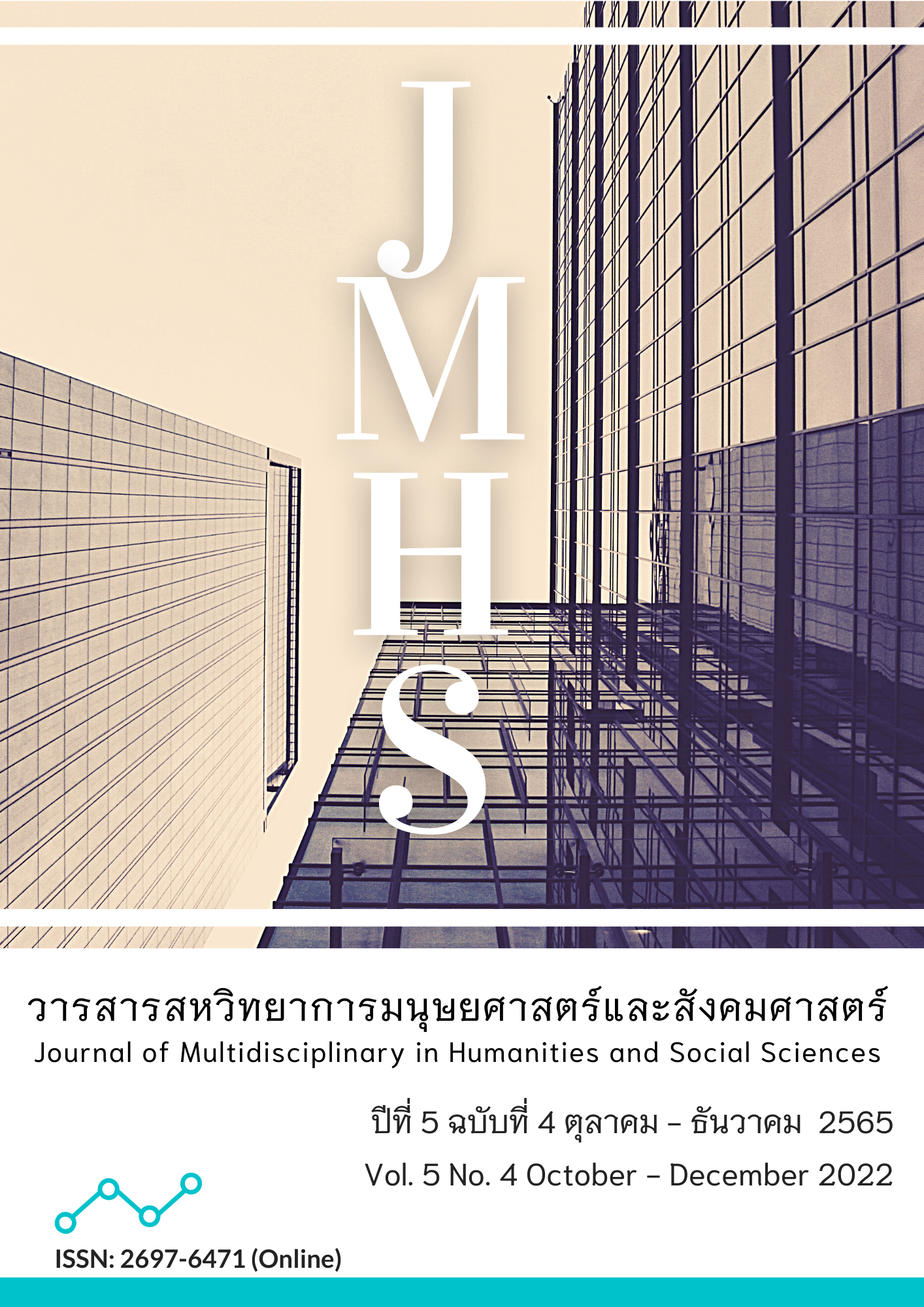The Development of Structural Equation Models of Factors Affecting Leadership Technology of School Administrators in The Digital Age Group Secondary School Southern Province, Gulf Coast under The Office of the Basic Educational Commission
Main Article Content
Abstract
This article aimed to 1) study the technological leadership level of school administrators in the digital era; 2) develop a structural equation model of factors affecting the technological leadership of school administrators in the digital era; and 3) examine the harmony of the structural equation model of factors affecting the technological leadership of school administrators in the digital era. The research model was quantitative research. Using the concept of structural equation model development as a research framework, the research area was secondary schools in the southern region along the Gulf of Thailand. The sample group consisted of 300 school administrators using a stratified random sampling method. The research tools were questionnaires. Data were analyzed using basic and reference statistics. The research results were found as follows:
1) The Technology Leadership of School Administrators in the Digital Era at the highest level.
2) The structural equation model of factors affecting the technological leadership of educational institution administrators in the digital era found that latent variables directly influencing technology vision were technological performance and technology integration. The latent variable that was indirectly influenced was technological vision.
3) A structural equation model of the factors influencing school administrators' technological leadership in the developed digital era. In harmony with empirical data, the variables that affect and related factors were studied clearly.
However, the knowledge and findings from this research were at the level of technology leadership. The highest level reflects the potential of the school administrators as well Moreover, the variables were correlated and harmonized according to research tests. although some variables had less direct influence than others. It must rely on the influence of other variables in order to reach the technological leadership of the school administrators.
Article Details

This work is licensed under a Creative Commons Attribution-NonCommercial-NoDerivatives 4.0 International License.
Views and opinions appearing in the Journal it is the responsibility of the author of the article, and does not constitute the view and responsibility of the editorial team.
References
กระทรวงศึกษาธิการ. (2563). ประกาศนโยบายและความสำคัญของกระทรวงศึกษาธิการ กรุงเทพฯ: กระทรวงศึกษาธิการ.
คมพิศิษฐ์ ศรีบุญเรือง. (2558). รูปแบบการพัฒนาภาวะผู้นำด้านเทคโนโลยีสารสนเทศและการสื่อสารเพื่อการศึกษาของผู้บริหารสถานศึกษาขั้นพื้นฐานในภาคตะวันออกเฉียงเหนือ(วิทยานิพนธ์) มหาวิทยาลัยราชภัฏสกลนคร.
ดวงเดือน ตั้งประเสริฐ. (2557). การศึกษาปัจจัยที่ส่งผลต่อความเป็นผู้นำด้านเทคโนโลยีสารสนเทศและการสื่อสารของการบริหารงานของโรงเรียนมัธยมศึกษาในจังหวัดนครราชสีมา. ในงานวิจัยระดับบัณฑิตศึกษาแห่งชาติ การประชุมใหญ่ปี 2014. (น.88-96). เมืองนครราชสีมา: มหาวิทยาลัยราชภัฏนครราชสีมา.
ธนกฤต พราหมน์นก. (2560). การศึกษาองค์ประกอบภาวะผู้นำทางเทคโนโลยีของผู้บริหารระดับมัธยมศึกษาตอนต้นสำนักงานคณะกรรมการการศึกษาขั้นพื้นฐาน(วิทยานิพนธ์). มหาวิทยาลัยบูรพา.
นงลักษณ์ วิรัชชัย. (2558). การวิเคราะห์ทางสถิติขั้นสูงที่เหมาะสมกับการวิจัยทางจิตวิทยาและพฤติกรรมศาสตร์. กรุงเทพฯ: จุฬาลงกรณ์มหาวิทยาลัย.
บุญจันทร์ บุญจันทร์. (2554). แบบจำลองสมการโครงสร้างของความเป็นผู้นำทางเทคโนโลยีของสถาบันการศึกษาขั้นพื้นฐานผู้บริหาร(วิทยานิพนธ์). มหาวิทยาลัยขอนแก่น.
สำนักงานเลขาธิการสภาการศึกษา กระทรวงศึกษาธิการ. (2560). แผนการศึกษาแห่งชาติ พ.ศ. 2560-2579. กรุงเทพฯ: สำนักงานเลขาธิการสภาการศึกษา.
สำนักงานศึกษาธิการภาค 5. (2563). ข้อมูลสารสนเทศ ประจำปีการศึกษา 2563. นครศรีธรรมราช: ประยูรการพิมพ์.
สุวิมล ติรกานันท์. (2554). การประเมินโครงการ: แนวทางปฏิบัติ. กรุงเทพฯ: จุฬาลงกรณ์มหาวิทยาลัย.
อโนทัย จำปาวงศ์. (2553). ปัจจัยการบริหารที่มีผลต่อคุณภาพของระบบสารสนเทศในสถานศึกษาสถาบันอาชีวศึกษาภาคตะวันออกเฉียงเหนือ(วิทยานิพนธ์) มหาวิทยาลัยบูรพา.
อินท์ฉัตร สุขเกษม. (2561). ปัจจัยที่มีอิทธิพลต่อความเป็นผู้นำทางเทคโนโลยีของสำนักงานป้องกันและควบคุมโรคในบุคลากร กระทรวงของสุขภาพ. นครราชสีมา: สำนักงานป้องกันและควบคุมโรคที่ 19.
Brown, T. (2010). Construct validity: A unitary Styles of School Principals as Predictors of Organization Climate and Teacher Job Satisfaction. Dissertation Abstracts International. 43(12), 3762-A.
Kline. R.B. (2011). Principles and Practice of Structural Equation Modeling. (4th ed.). New York: The Guilford Press.
Miller M.L. (2008). A mixed-method Study to Identity Aspects of Technology Leadership in Elementary schools. (Doctoral Dissertation). Regent’s University.
Stegall P. (1998). The Pricipal-key to Technology Implementation. New York: Macmillan.
Zhong L. (2017). Indicators of Digital Leadership in the Context of K-12 Education. Journal of Education Technology Development and Exchange, 10(1), 27-40.


